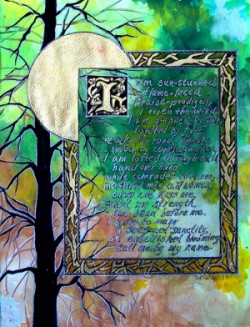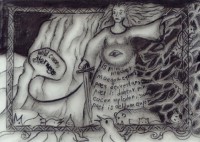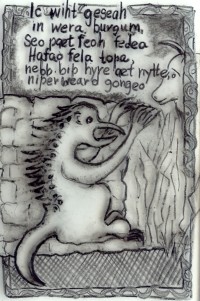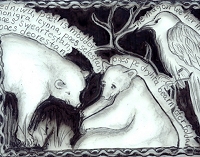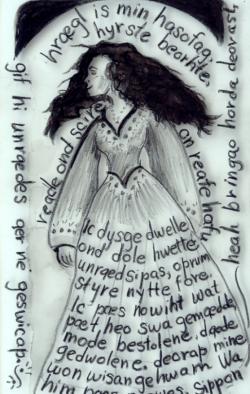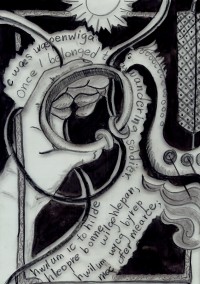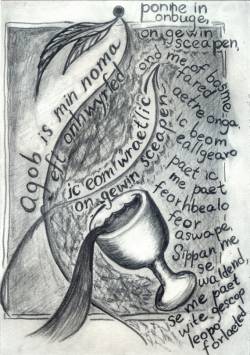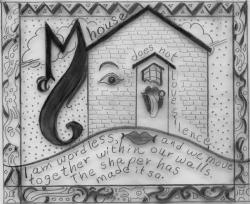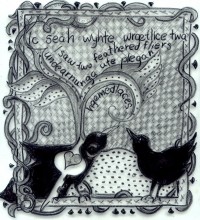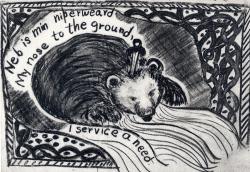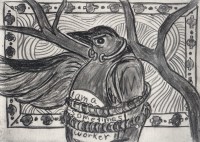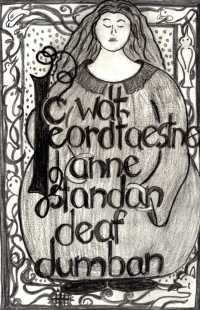

12
Fall 2008
Twelve Anglo-Saxon Riddle Poems
translated by Bertha Rogers
The following Anglo-Saxon riddle poems from the 10th-Century Exeter Book translated by Bertha Rogers will be included in her forthcoming book Uncommon Creatures and Singing Things: Anglo-Saxon Riddle Poems. The ninety-plus riddle poems, rich in metaphor and mystery, were probably written down as far back as the late seventh century by persons unknown. The collection was given to the Exeter Cathedral Library by Leofric, first Bishop of Exeter.
Tree / Wood (Anglo-Saxon)
Ic eom legbysig, lace mid winde,
bewunden mid wuldre, wedre gesomnad,
fus forðweges, byrnende gled.
Ful oft mec gesiþas sendað æfter hondum,
þæt mec weras ond wif wlonce cyssað.
þonne ic mec onhæbbe, ond hi onhnigaþ to me
monige mid miltse, þær ic monnum sceal
ycan upcyme eadignesse
Tree / Wood (Translation)
I am sun stunned, flame woven.
Praise prodigal, I vixen the wind.
I am gripped by gales and fondled by fire,
ready for road, flowering wood, or conflagration.
I am lofted through the hall, hand-over-hand,
while comrades glory me, fine men and women
clasp and kiss me, extol my strength, and bow to me.
I bring to many a seasoned sanctity,
embellished blooming.
Iceberg (Translation)
What came after the wave—a sharpness,
low-talking creature drawn to the land.
She laughed out loud, hovered in that place,
bringing threat to men in their homes.
Her sword was sharp, and she was grim,
slowly moving to war, that vicious biter.
Murderer, she lashed at moving walls,
aired orotund obscenities.
She spoke of her own self:
My mother, that queen descended
from those most loved, is my own daughter
now great with child. So it is made
known to men on earth and sea—
she will come, full of grace, to rest
in the world, on every land.
Rake (Translation)
Near to men's houses and towns
I saw a weird creature—it feeds the cattle
with its many teeth and long beak.
A well-worked slave, it digs the earth,
tears at plants, bothers walls like a dog,
or scratches fields for gold, seeks crops,
and brings them home.
Its victim is kneed stem and rickety root.
Strong seed and flourishing bloom
on a fulgent feed is its bounty.
Mother Nature (Translation)
This mother keeps
the many and varied creatures of Middle Earth—
the gloomiest, the wildest, most loved of
the Lord God's children who may happily hold
or rightly rule in this broad home.
Nor would we live without her offspring.
How she bears us, who she is, is a riddle.
All think who are wise; all who walk in the world
should know how to call her name!
Cup of Wine / Spirits (Anglo-Saxon)
Hrægl is min hasofag, hyrste beorhte,
reade ond scire on reafe hafu.
Ic dysge dwelle ond dole hwette
unrædsiþas, oþrum styre
nyttre fore. Ic þæs nowiht wat
þæt heo swa gemædde, mode bestolene,
dæde gedwolene, deoraþ mine
won wisan gehwam. Wa him þæs þeawes,
siþþan heah bringað horda deorast,
gif hi unrædes ær ne geswicaþ.
Cup of Wine / Spirits (Translation)
Gray is my gown, yet bright as silver,
exalted by glittering garnets.
I madden the minds of men; foolish,
they listen and rage; and I ensnare the silent ones,
those who thought they knew the way.
Nor do I know why they desire me,
wish to lose their thoughts, let go potency.
This is a riddle. If my deceitful deeds they exalt
as they loft me in their hands, heedless gift,
they will know sad suffering in the depths
of their brief gladness.
Horn (Translation)
Once I belonged to a wandering soldier.
Behold my fine cover!
A young prince adorns me in gold and silver,
bright wire. I am kissed, as I, brilliant,
make my sounds, stay at the front
while my wave runner sails over the flood,
consumes the storm. Sometimes, in my tribe,
a woman adorned with rings fills me with food,
lays me on the table; they devour my goods
on the wood; and I lie, emptied of treasure,
while men sit drinking, a warrior's jewel.
Beautiful, golden, I sometimes hang on the wall,
flaming noble. Sometimes I am hosted
by the folk warrior's horse,
my sound bringing men to wine.
Sometimes I warn and rescue,
or take the joy from hostile camps,
scattering thieves for my lord.
Call me by my name!
Bow (Anglo-Saxon)
Agob is min noma eft onhwyrfed;
ic eom wrætlic wiht on gewin sceapen.
þonne ic onbuge, ond me of bosme fareð
ætren onga, ic beom eallgearo
þæt ic me þæt feorhbealo feor aswape.
Siþþan me se waldend, se me þæt wite gescop,
leoþo forlæteð, ic beo lengre þonne ær,
oþþæt ic spæte, spilde geblonden,
ealfelo attor þæt ic ær geap.
Ne togongeð þæs gumena hwylcum,
ænigum eaþe þæt ic þær ymb sprice,
gif hine hrineð þæt me of hrife fleogeð,
þæt þone mandrinc mægne geceapaþ,
fullwered fæste feore sine.
Nelle ic unbunden ænigum hyran
nymþe searosæled. Saga hwæt ic hatte.
Bow (Translation)
Wob (Blank) is my name, spun around—
I am an uncanny creature, battle-shaped.
When I bulge, and my skirmish-fang strikes
right through my guts, I am ready
to turn away that which brings death.
At last my lord and persecutor
lets go my limbs, and I am tall again.
When armed for murder, I throw up
death's taste, that which before I ate.
Nor does the twang and screech from my guts
go without objection. That man who grabs
this speeding cup lets go his breath for the last gulp.
If I am unbound I listen to no man;
bound and wound, I am a slave.
Speak what I am called.
Fish and River (Anglo-Saxon)
Nis min sele swige, ne ic sylfa hlud
ymb [ . . . . .]; unc dryhten scop
siþ ætsomne. Ic eom swiftre þonne he,
þragum strengra, he þreohtigra.
Hwilum ic me reste; he sceal rinnan forð.
Ic him in wunige a þenden ic lifge;
gif wit unc gedælað, me bið deað witod.
Fish and River (Translation)
My house does not love silence; it is loud.
I am quiet, and we move together within our walls.
The Shaper has made us so. I am faster,
and sometimes have more strength, but
he lasts longer and runs harder.
Sometimes I rest, but he must move on.
My life is held within my house;
without him I must die.
Cock and Hen (Translation)
I saw two feathered fliers join
fearlessly, quickly in the open air,
their mingling beautiful.
The gold-headed girl, roseate and proud,
would wax wide if the work went well.
Now those who study may wish these letters
to grasp my thoughts: O & C, N & E, K & H,
and another C. Turn and twist the key of letters
as the door to the hoard fans wide—
And seekers will know what is in
the riddle's heart, skill, and play.
Laughing, drinking men may say
the names of this earthly pair!
Plow (Anglo-Saxon)
Neb is min niþerweard; neol ic fere
ond be grunde græfe, geonge swa me wisað
har holtes feond, ond hlaford min
woh færeð, weard æt steorte,
wrigaþ on wonge, wegeð mec ond þyð,
saweþ on swæð min. Ic snyþigeforð,
brungen of bearwe, bunden cræfte,
wegen on wægne— hæbbe wundra fela.
Me biþ gongendre grene on healfe
ond min swæð sweotol sweart on oþre.
Me þurh hrycg wrecen, hongaþ under
an orþoncpil, oþer on heafde,
fæst ond forðweard. Fealleþ on sidan
þæt ic toþum tere, gif me teala þenaþ
hindeweardre þæt biþ hlaford min.
Plow (Anglo-Saxon)
My nose to the ground, I service a need.
Grunting in the cave I've made,
I am slave to my leader, hoary forest enemy,
my master unjust, dangerous.
Towards him I go, feeding my tongue.
I strive, and I am pushed down.
He sows his seed. Crafted of wood,
I live for the ground. I'm bound by magicians,
carried by wheels. I am weird.
While I grovel, one edge of my path
gathers green while the other is richly black.
A sharp sword thrusts through my spine and stomach,
and a dagger-tooth is shoved into my head.
What I knife falls, curving death, to one side
if my enslaver pushes me well.
Bell / Quill Pen / Millstone (Translation)
Ring bound, I am a sometimes worker,
avidly giving way to him whom I serve.
I leap from my night bed, bright-call
that my hall lord has gifted me with a torc.
Often, though sleep bereft, I must bide patiently
the grim-hearted wave of master or miss.
Though winter rimed, I respond.
A warm limb bursts my torc at times,
making joyful both me and my dullard servant.
If we are lucky, I sing truth,
a sounding, word-full riddle.
Oven (Translation)
Deaf, dumb, conjuring meals from men's hand gifts,
I swallow, every day, treasures more precious than gold,
sustainers carried to my mouth by a slave.
Kings, queens, princes desires my confections
for good and gladness. To what race
do I belong, treasure-making shaper,
dark seeker who swallows all without speaking,
Can you say?
Bertha Rogers' poems and translations have been published in magazines and literary journals and in several collections. Her translation of the riddle-poems from the 10th-century Anglo-Saxon Exeter Book will be published in 2009 by Birch Brook Press, publisher of her translation of Beowulf (2000). Her forthcoming poetry collection, Heart Turned Back, will be published by Salmon Poetry (Ireland) in 2009. She is founding director of Bright Hill Literary Press and Literary Center in Treadwell, NY.
Poetry Feature
